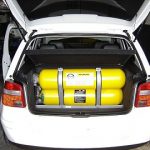Nigerians continue to endure a steep rise in transportation costs, despite recent government interventions aimed at reducing pressure on commuters. The introduction of Compressed Natural Gas (CNG) as an alternative to Premium Motor Spirit (PMS), and the modest drop in fuel pump prices, have failed to ease the burden on passengers and drivers alike.
Thirty-one passengers interviewed across motor parks in Lagos, Ogun, and Oyo states expressed frustration over the persistent fare hikes, which they blamed on exploitative practices by transport unions. Many lamented that fares remain unaffordable even after fuel prices began to drop from their peak of N1,200 per litre, noting that since the start of the current administration, transport costs have surged by as much as 400 per cent.
Findings reveal that commercial drivers are compelled to pay at least three different levies daily—booking, loading, and ticket fees—depending on the control of park unions and state authorities. These levies, drivers say, eat deep into their earnings and compel them to increase fares to stay afloat.
Data from the National Bureau of Statistics’ April 2024 Transport Fare Watch indicates that the average fare for intercity bus travel surged to N7,122.57 from N3,994.51 in April 2023. Though there was a slight month-on-month decrease of 0.43 per cent from March 2024, the difference remains significantly high.
At Iwo Road, a passenger traveling to Ondo, said his business was nearing collapse due to transportation costs. He argued that road transport plays a vital role in supporting small and medium-sized enterprises (SMEs), yet the sector remains in the hands of individuals perceived to lack formal training and oversight. He expressed regret that despite the President’s economic measures, the impact has been watered down by unregulated transport unions.
He recounted being harassed by members of the National Road Transport Workers when he questioned their conduct. He called for immediate intervention by all levels of government, pointing to the unions’ unchecked levies as a root cause of inflated fares. He explained that goods he sells in Ondo are priced higher largely due to transport costs, which are worsened by “sitting fees” and other hidden charges passed onto passengers.
Another commuter criticized both federal and state governments for ignoring the actions of so-called “area boys” who, under the guise of union activities, impose charges and overload vehicles, compromising safety in pursuit of profit. According to her, passengers face constant discomfort and danger from overcrowding, while drivers are threatened into silence.
A commercial driver described the current system as deliberately designed to impoverish transporters. He urged the government to introduce effective regulation and restructure the industry. He lamented that profits rarely cover fuel, repairs, and union fees. Instead of growing their businesses, many drivers end up abandoning vehicles or turning to union leaders for new ones under costly repayment plans, further deepening their dependency.
In his words, “We work only to feed mechanics, fuel stations, and union leaders. Drivers are suffering, while transport unions are getting fat.”
As fare hikes continue to strain households and cripple small businesses, both drivers and passengers are demanding urgent reforms to make transportation more affordable, transparent, and accountable.










